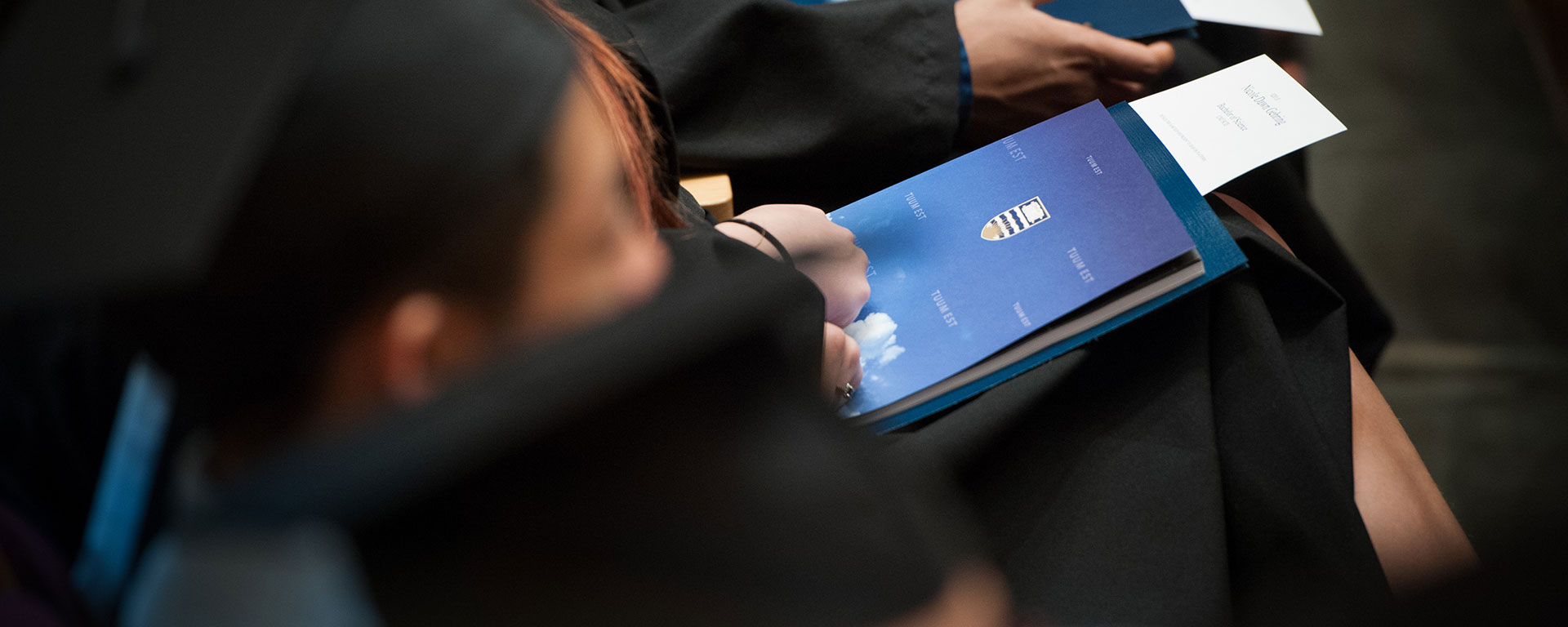Think ahead, make the right choices and stay on track as you progress towards receiving your LFS degree.
Declaring Your Major

Depending on your LFS program, you may have to select a major after completing your first year. A major is a specialization in a single field of study within your degree program. You will select your major in your second year, either by declaring it online for non-competitive majors, or by applying to a competitive major.
Competitive majors come with additional requirements and an application process. Your first year is a great time to explore which major you may be interested in, and any application requirements
Adding a Minor

In addition to your major, you might also want to add a minor to your degree. A minor is a secondary area of specialization, and can include subjects available in other faculties. Not all minors are available in all LFS programs, so it’s vital to research the choices open to you. Start your research here here.
You can apply for a minor during your second year. Keep in mind that space may be limited and there may also be prerequisites. Applications for minors must be made to LFS Student Services by March 31.
Click below to jump to your relevant section:
- Registration
- Dropping Courses
- Electives
- Stay on Track
- Taking Courses Outside of UBC
- The Academic Calendar
- How to Continue and Progress
- Graduation
Registration
There are two academic sessions at UBC. Winter Session runs from September to April and comprises two terms. Registration for both Winter Session terms takes place in June/July. Summer Session runs from May to August and comprises two terms. Registration for both Summer Session terms takes place in February/March.
You will receive an email approximately one week before it’s time to register for each session. This tells you the specific date for your registration. Don’t miss your dedicated timeslot! You’ll find general information about the scheduling of registration dates here. Registration can feel daunting but don’t worry: you are not alone and there is lots of support available for you during the process.
Before registration, decide which courses you want to take. Your course selection depends on which LFS degree program you are enrolled in. Check the Academic Calendar for your program and the courses it offers.
All new undergrads are also enrolled in LFS ROOTSS. It’s an online program that helps you navigate your transition to UBC. It includes invaluable registration support and resources for new first year students.
Once you have an idea of the courses you’d like to take, you can create draft timetables (also known as Worklists) via your Student Services Centre (SSC) portal. You can adjust these potential timetables until they work. You will also find any applicable transfer credits you may have listed here under the Grades & Records tab.
Need more information on registration? Visit our FAQs for registration answers as well as this general UBC page. And also watch your email inbox for LFS registration messages, complete with additional resources and step-by-step support.
Dropping Courses
It is important to drop a course as soon as you know you don’t want to take it anymore. At the start of every term, you will have a small window to drop a course without penalty and without it appearing on your academic record. After the Add/Drop deadline, a ‘W’ (for withdrawal) will appear on your record, although this will not affect your GPA. There may be other implications for dropped courses, so it’s important to contact an academic advisor for further guidance.
Electives
Most LFS degree programs include restricted and unrestricted electives.
Restricted electives (RE) are courses you choose yourself from a list of approved courses relevant to your major. Each major has its own REs––you can view them here.
Health electives (HE) are a subset of REs specifically related to Health topics, for the Food, Nutrition, and Health major. You can see them noted on the RE list with an asterisk*.
Food Science Electives are a subset of REs specifically related to Food Science topics, for the Food Science major. You can see them noted on the RE list with an asterisk*.
Unrestricted electives (URE) are courses you choose from any discipline. This is where you can explore interests beyond your degree program. As long as you meet the course prerequisites or restrictions you can take it!
Make sure you choose your electives carefully. Talk to your program advisor or an academic advisor first. And make sure you confirm your degree requirements in the UBC Academic Calendar.
Stay on Track
Want to make the right choices and progress effectively towards your degree? After declaring your major, you can access UBC’s Degree Navigator by logging into your Student Service Centre (SSC). From the site’s Registration pull-down menu, select Degree Navigator – Vancouver then click your major on the right-hand side of the screen. From here, choose Audit – UBC Report from the drop-down menu. You will now be able to view your degree requirements, seeing which courses you have completed and which ones you still need.
If you have questions about your Degree Navigator information, contact LFS Student Services directly.
Taking Courses Outside UBC
UBC students are not normally permitted to take courses for academic credit at other post-secondary institutions while also studying here.
If you have failed a course twice at UBC, you may be permitted to complete the equivalent at another institution. If this situation applies to you, contact an LFS Academic Advisor right away to discuss your options.
In rare extenuating circumstances, our faculty may also grant you permission to complete courses elsewhere. Requests to attempt required courses for your LFS degree for the first time at another institution will not normally be granted. Always contact one of our academic advisors first to discuss your situation.
A written Letter of Permission (LOP) from the Director of Student Services is required before attempts to register in an external course are made. The Faculty is not obligated to approve a transfer credit if an LOP has not first been obtained.
To request taking courses at another institution, complete the online Letter of Permission (LOP) Request Form, or meet in-person with one of our academic advisors. You must make this request as far in advance as possible. This will ensure we have appropriate time to review and respond; decisions cannot be expected on the spot.
The Academic Calendar
The UBC Academic Calendar includes all UBC’s rules, policies, course and program information. Academic advisors, your instructors and your Enrolment Services Advisors (ESAs) often refer to the calendar, so it’s important to familiarize yourself with it. Explore it online; and contact an LFS academic advisor with any questions.
How to Continue & Progress
You are not automatically permitted to stay in LFS or at UBC––you have to work for it! To progress from one year to the next, you must maintain a minimum academic average, meet a minimum overall credit load and have completed specific courses. See below for more information, and consult the Faculty’s Year Promotion and Academic Standing section of the UBC Academic Calendar for more information.
Sessional Evaluation
Your academic performance will be evaluated in May, after your Term 2 grades are posted. During this sessional evaluation, LFS Student Services will review your academic performance (your average) and the courses you registered in to confirm you are following your LFS program. We will assign you the appropriate academic standing for the Winter Session just concluded.
Academic Standing
There are three possible categories of academic standing: Good Standing, Academic Probation and Failed Standing. You should always be aiming for Good Standing, achieved by following your degree requirements and maintaining an average of 60% or higher.
Academic Probation or Failed Year Standing: If your average falls below 60%, you may end the year on Academic Probation or Failed Year Standing. This means you may need to take additional steps to prepare for registration in the coming year, or you might not be eligible to continue.
Year Level
Year level means the academic year level within your program. Depending on the number of courses you complete in a given year, this may not be the same as the number of years you have attended UBC. If you follow the degree requirements of your program as listed in the UBC Academic Calendar (and pass them all!), you should be promoted from one year to the next.
You need to pass a minimum number of credits and complete specific degree requirements within those credits to be promoted from one year level to the next. Keep in mind that it can become increasingly difficult to course-plan and register in required courses if your year level is out of sync.
Contact us!
Following sessional evaluations, LFS Student Services will send you an email to notify you of your results. You must read this email carefully and understand it. Please contact us with any questions. We know this process can cause anxiety, so please reach out if there is anything you are unsure of. We are always here to support you.
Taking an Academic Leave
If you need a break from school for personal, financial or other reasons, we recommended discussing this decision with an academic advisor first. Working with our campus colleagues, we will help you navigate the process and ensure you’re set up for a smooth return in the future. We can also connect you with appropriate resources for support or map an alternative plan that better suits your needs. Read more about academic leave in the UBC Academic Calendar, and connect with us at any time to discuss further.
International students may be eligible for an International Undergraduate Leave (scroll to If you might take a gap in the future: Authorized Leave).
Graduation
Graduation is the most celebrated time of your UBC career. But it is not automatic: you must follow your degree requirements and meet all deadlines in order to graduate. Read about some of our recent graduates here.
Monitor your Progress
Keep track of your progress using the Degree Navigator tool in your Student Service Centre (SSC)––and by following the program requirements listed in the UBC Academic Calendar [add link]. If you are in fourth year and you’ve finalized your registration for your final year, you can also contact our office to request a grad check. Please email us with your request.
Keep track of your progress using the Degree Navigator tool in your Student Service Centre (SSC)––and by following the program requirements listed in the UBC Academic Calendar. If you are in fourth year and you’ve finalized your registration for your final year, you can also request a grad check using our online request form.
Requirements to Graduate
In addition to the Campus-Wide Policies and Regulations for Requirements to Receive a Degree or Diploma from UBC , LFS students must present a minimum of 45 upper-level (300- and/or 400-level) credits to graduate. Most students will fulfill this by completing their degree requirements, but it is your responsibility to ensure this minimum upper-level credit requirement is met. Students are expected to apply for graduation once their program requirements are met, and may only attempt a maximum of 180 credits towards completing their degree.
Apply to Graduate
You must submit a formal application to graduate, even if you don’t plan to attend the ceremony. UBC has two convocation ceremonies each year: Fall (November) and Spring (May/June). Our bi-weekly email newsletter, the Newslettuce, will notify you about when and where to take your official graduation photos. You will also find details about graduation eligibility, application timelines and next steps here.
Questions? Check out our FAQ

You’ve got questions? We’ve got answers! Here is where you’ll find the information to satisfy your burning questions.
